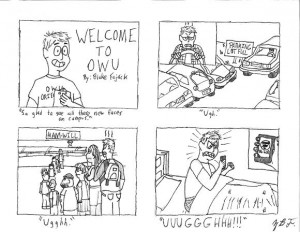
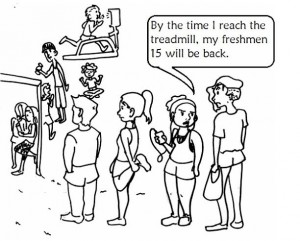
How Gender and Greek life shape SLU membership
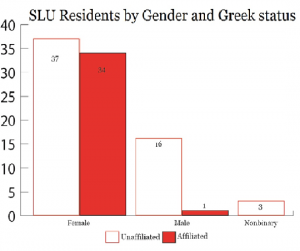
At the start of each spring semester, OWU’s Small Living Units seek new members ‒ but they’re running into increased competition with fraternities, most often for male candidates.
“I think that the fraternity system here at OWU, the fact that it’s residential, is why the gender ratios are so skewed in the SLUs,” said Citizens of the World (COW) House moderator Kerrigan Boyd, a senior.
“…In some ways it’s kind of cool that the SLU community is primarily driven by women, just because I feel like there are so…few things in society that are, but I feel like we strive for a community that’s inclusive of a variety of diverse backgrounds, including gender diversity.”
In terms of gender, OWU’s student body as a whole is 54 percent female and 46 percent male, according to the OWU website; data on non-binary students was not available and is not recorded by the University.
Non-binary, as described by sophomore Women’s House (WoHo) resident Rowan Hannan, refers to a gender identity that is different from the one assigned at birth; this includes a wide variety of genders beyond assigned and self-identified male or female.
A survey of SLU gender demographics finds that there are more than four times more women in SLUs than men and at least three non-binary students, including Hannan, who live in WoHo.
These statistics were provided by SLU moderators and some residents; there may be additional non-binary SLU residents whose identities aren’t fully known or realized, and were not counted accurately as a result.
Senior Meredith Harrison, WoHo moderator, said the SLU community tends to be fairly homogenous as a whole.
“We have a lot of cisgender, heterosexual white people; it’s predominantly female,” she said.
Low male participation – and a new exception
“There are absolutely less men who go through that (SLUsh) process, but I think at the end of the day that is a choice that our male students have to make (between fraternities or SLUs),” said Levi Harrel, residential life coordinator for the SLU community.
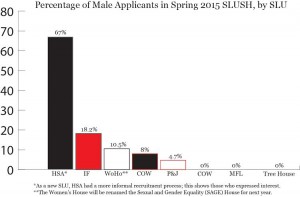
The Memorandums of Understanding (MOUs) between Ohio Wesleyan and the seven residential fraternities currently on campus require all fraternity members to live in their houses, unless they work for Residential Life or the houses are above capacity.
“I can understand why the university wants to fill all the (fraternity) houses, because it’s more efficient that way,” said senior Brian Cook, president of the Inter-Fraternity Council (IFC).
“At the same time, I think I can understand why SLUs might be frustrated with that process.”
The MoUs make it rare for active fraternity members to live in SLUs, although there are some ways they can do both at the same time.
The most likely way for active fraternity members to live in a SLU would be if their organization is non-residential ‒ such as Phi Gamma Delta (FIJI) or one of the National Pan-Hellenic Council groups, nine traditionally African-American Greek organizations. Currently, no one is using this option, however there will be a member of FIJI in the House of Spiritual Athletes next year.
While FIJI will be a residential fraternity again starting next semester, the chapter will be above occupancy due to increased recruiting in the past. It’s not known yet whether HSA will have a house or if it’s members will be living in other housing, though.
With ten members, HSA’s residents will make up half the male population of next year’s SLU community, but they plan to recruit women in the future.
“We had interest from some women, but there were a lot more guys interested and we didn’t want to have an awkward guy to girl ratio,” said freshman Conner Brown, one of two candidates to be HSA moderator.
“We do plan to offer and integrate women into the SLU in the future but we knew we may not even have a house this next year.”
The second most likely exception is if they are the moderator ‒ equivalent to a resident assistant for dormitory life, thus exempting them from the Greek residency requirement.
There is one actively Greek male moderator, senior Noah Manskar, who’s also the only male moderator this year. To do this, he had to join his SLU, become moderator and then go Greek ‒ then be selected as moderator again to remain in the house.
The structure of this year’s fraternity rush and SLU rush (SLUsh) processes also required potential new fraternity members to make a decision on their bids before receiving SLU interview results, leading several male students to opt out of SLUsh entirely.
Challenges with fraternity recruitment
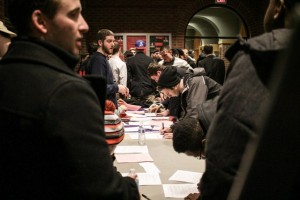
“I’ve heard of a lot of men who drop out – they do start slushing and then they drop out because they get bids,” said senior Meredith Harrison, moderator of the Women’s House.
The House of Peace and Justice (P&J) was hit particularly hard by this ‒ originally four men signed up for interviews, but three received fraternity bids and withdrew from the SLUsh process to accept them.
“We had one (man), out of 21 people (who applied),” said Manskar, P&J’s moderator.
“I think we have definitely noticed a decrease in the amount of men who have applied to houses this year,” said junior Reilly Reynolds. “I think all the members of the SLUs have.”
Reynolds is moderator of Tree House, which had 17 students apply during this SLUsh season. None of them were men.
“I really don’t think it’s fair to the guys, because they have to make a decision on Greek life before they make a decision about SLU life,” she said.
Sophomore Cindy Hastings, also a Tree House resident, added that the low gender ratios can also deter some non-Greek men from the SLUsh process, as they may not be as comfortable applying and interviewing at an all or mostly-female house.
The Women’s House encounters this in more than most; Harrison said the current name may discourage some men from applying. This year they had two men apply, which she said is “really good for us.”
While it’s rare for men to be involved in SLU and fraternity life simultaneously, students can do both over their four years at Ohio Wesleyan, and several have. In most cases, though, they leave their SLU to go Greek, rather than the other way around.
Senior Kyle Simon is one of those who’ve done both ‒ he lived in the Women’s House (WoHo) his sophomore year before moving into Chi Phi last year.
“It was really, really wonderful,” Simon said about his time in WoHo.
While he enjoyed the experience, he found Greek life offered a different type of community that appealed more; close personal friendships with future fellow members also led him to Chi Phi.
Simon remains active in some SLU programs, and credits his dual experience of SLU and Greek perspectives as being really helpful.
“I think they’re really good options for people, but they’re completely different types of structures,” he said.
“Every SLU and every Greek organization’s so different that it’s not really the same decision (to join one or the other.)”
Harrison said Simon’s done a lot to connect her house and his fraternity after leaving, though the two organizations already had a strong connection.
During Take Back the Night, an annual Women’s House event, members of Chi Phi will guard WoHo in its residents’ absence. This safety measure is due to a 1984 incident where two male students threw a smoke bomb into the house and nearly burned it down.
“I feel like, as far as fraternities go, we’ve always had a really good relationship with Chi Phi,” Harrison said.
Benefits of Greek and SLU overlap
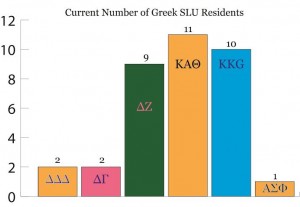
Alpha Sigma Phi also has a former SLU resident, junior Scott Woodward, and current SLU resident Noah Manskar.
Woodward lived in the House of Thought (HoT) last year and moved into Alpha Sig this year after accepting a bid.
“Deciding to slush and live at (HoT) was one of the best decisions I’ve ever made in college,” Woodward said.
He decided to rush to learn more about the Greek community, something he hadn’t considered joining before coming to college.
“Leaving House of Thought for Alpha Sig was the definition of bittersweet,” he said, but the commitments of both would have been too much to handle on top of academics and clubs.
Brian Cook, president of the Inter-Fraternity Council, is also a member of Alpha Sig and he described the benefits the chapter has received from having SLU members.
“The people that tend to join SLUs, at least in our example, (have) a different way of thinking about things than people who may be prone to join a fraternity so it’s good to have that kind of diversity of thought flowing around,” Cook said.
In particular, he discussed how Manskar has integrated one of his Peace and Justice house projects into Alpha Sig’s OWU chapter community.
Two years ago, Manskar hosted a V-Men workshop for the campus, but had a small turnout of 15 participants.
V-Men is a program created by the V-Day organization, which also created the Vagina Monologues, to bring men together around the issue of violence against women and girls.
After joining Alpha Sig last spring, partly to integrate SLU ideals into the fraternity community, Manskar held the workshop within his new chapter.
“All of our guys loved it and we really appreciate him doing that,” Cook said; the chapter is now making it part of their new member education process.
“At least in our example those guys (Manskar and Woodward) were willing to take the charge on that, because of their experience with holding those kinds of programs in their own SLUs,” he added.
While Meredith Harrison said she hopes for more fraternity-SLU outreach, she sees a lot of positives in the relationship between SLUs and OWU’s sororities.
“For Women’s Week, a lot of sororities support it and I think that is because we have so much Greek representation in our house,” she said.
This year, the Women’s House has had one member from Kappa Alpha Theta, one from Kappa Kappa Gamma and two from Delta Zeta, though one of them withdrew from the university after the fall semester.
“(SLU membership) does impact (the sorority community), but in a natural way because they’re living with different people, so they get to share those things that they’re learning with different people,” said sophomore Jocelyne Muñoz.
“They get to get other perspectives, so (it’s) definitely a positive.”
Muñoz is community development director of OWU’s Panhellenic Council, the sorority equivalent of IFC, and a member of Delta Gamma.
Strong bonds between SLUs and sororities
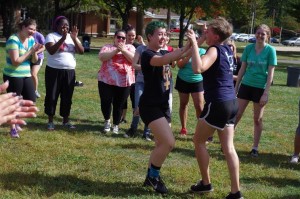
Unlike fraternity members, sorority members cannot live in their houses at Ohio Wesleyan, and so a sizeable percentage of the female SLU community are also sorority members.
Of the six female SLU moderators this year, for example, four are in sororities.
“(SLU life) encourages more active members in the OWU community,” said junior Natalie Geer, president of OWU’s Panhellenic Council.
Muñoz added that living in the same SLU “absolutely” connects members of different sororities, and that the presence of sorority members in SLUs “definitely” brings their non-SLU members to events.
“There is (an) impact from having your sisters in (SLUs) so more of those sisters will attend those events because they’re involved,” she said. “But I don’t think it should stop others from attending those events, just because they’re getting that (sorority) support anyways.”
At the Citizens of the World (COW) House around half the female residents are in sororities but this doesn’t have a significant impact on the House culture, according to moderator Kerrigan Boyd.
“I think that people who are involved in SLUs and Greek life a lot of times are leaders and people that really strive to be deeply involved in the OWU community,” said Boyd, also a member of Kappa Kappa Gamma.
“…I think that having people who are leaders in multiple settings, not just SLUs, doesn’t isolate us; I think that that’s been a strength.”
“I think my experience with all the Greek women I’ve lived with is they are fully part of both,” said Noah Manskar, Peace & Justice House moderator.
“They hold officer positions in the sororities and they put on great house projects here. I think it’s good that the SLUs are kind of integrated with the sororities…(they) seem to mesh very well.”
In P&J there’s an even split this year: six affiliated women, six unaffiliated women, and five men. Among the sorority women of P&J, there is one Kappa, two Tri-Deltas and three Kappa Alpha Thetas.
Kappa Alpha Theta has the highest number of sorority SLU residents, with eleven.
A safe space for other gender minorities
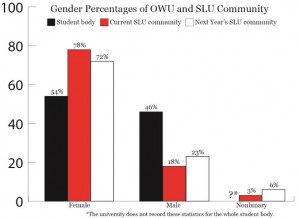
Each year, SLUs must go through a renewal process; this year the Women’s House requested to change their name to the Sexual and Gender Equality (SAGE) House after lengthy discussion among current and potential new members.
The change was part of a deliberate strategy by moderator Meredith Harrison to make the house more queer-inclusive. Queer, used as a positive term by Harrison, refers to non-heterosexual sexual and romantic orientations and non-binary gender identities.
“This year, we started having conversations about the house name and how it could be really alienating to our non-binary housemates or trans men on this campus,” she said. “…I’m really proud of my community for wanting to become more inclusive.”
Hannan, who joined the house at the start of this year, said they’ve been able to better understand their gender identity because of their time in the house and the supportive environment it’s residents provide.
“Because we continually work to create a safe space, it has allowed me to explore my gender as well as the way I perceive others,” Hannan said.
“I often forget that when leaving the SLU bubble that people will not ask for my pronouns, will assume my gender based on the way I present, and will often not acknowledge the existence of non-binary genders.”
While they could only speak from their own experience, Hannan said they thought the SLU community can be more comfortable than Greek life for non-binary students.
“Fraternities and sororities literally represent the gender binary,” they said. “…However there are trans and non-binary people who are happy in fraternities, and I think it isn’t something to necessarily be generalized.”
The number of non-binary SLU residents for next year will increase from at least three to at least five, and not all of them will live in the SAGE House.
“I have only experienced one slush with the house so I can’t speak to a trend, but there were several non-binary applicants this year, and I know there have been in the past,” Hannan said.
“I wouldn’t say there is more, but I feel that PRIDE and SAGE have both done very well this year in creating an atmosphere of acceptance and safety, and allowed people to explore and come out in their identities.”
Harrison added that the house’s name change reflects a growing trend in the feminist movements that SAGE reflects.
“Women are not the only gender minorities – the trans community, non binary people, you can’t ignore that and you can’t ignore that in feminism, you can’t ignore that in the queer movement,” she said. “So I think changing the name and the mission statement is absolutely necessary for how gender politics are going.”
Hannan said they want to create more safe spaces for non-binary students, but also “brave spaces” where students can “challenge what people say and try to educate others and create a genuine dialogue.”
“The best way to be an ally to people of other identities is to listen, and to use your privileges to challenge ignorance, and empower others,” they said.
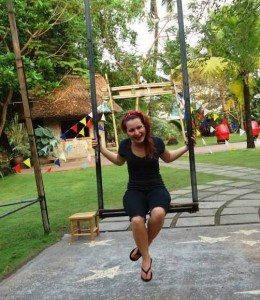
In May 2015, senior Caitlen Sellers will join a team of runners on a 300 kilometer journey across the Democratic Republic of the Congo. The seven-day trek is meant to raise support for gender equality and coffee-farming communities.
Run Across Congo, organized by the nonprofit On the Ground, will take the team through unpaved trails in the Congo and bring them into contact with communities destabilized by unfair labor practices. Sellers said the goal for each runner is to raise $15,000. This money will go to programs empowering women, including self-esteem workshops, business initiatives and efforts toward increasing the visibility of women in agriculture.
“It’s investing to create these programs to really educate the people and empower the women,” Sellers said of the project. “We want to help them stay together by talking about fair trade.”
Sellers said she was interested in participating because she sees a separation between coffee-farming communities and the people who consume the product of their labor. According to the CIA World Factbook, 71 percent of the population of the Congo was below the poverty line in 2006, while agriculture made up almost half of the gross domestic product composition (by 2013 estimate).
“I see myself as more of an advocate than a runner just because it’s so important to me that people see how their purchases affect the lives of people halfway around the world,” Sellers said. “Responsible consumerism helps to de-fetishize commodities, humanize the farmers who live and work in harsh, unfair conditions and create positive impacts.”

The total distance covered divides roughly to one marathon a day, and Sellers said the team can’t be sure of accommodations at their destinations.
“We might be camping out a few nights,” she said, though she added vans will ensure the team doesn’t go without food or supplies.
“Running inspires people because it’s a really difficult thing to do,” Sellers said. “I think people will get excited because they see what we’re willing to do to get on the ground and really see what’s going on.”
Sellers said because the team was only established a week ago, she hasn’t had the chance to research the culture of the Congo, meet many of her teammates or begin fundraising efforts. However, Sellers said each member of the team has a Razoo account, and Sellers has a PayPal for larger donations. Sellers also said she will be going to local businesses to request sponsorship, passing out flyers and potentially putting on interactive educational events.
On the Ground funds runs in other depleted regions, such as Ethiopia and Palestine. More information on On the Ground and Run Across Congo can be found at http://onthegroundglobal.org/.
Caitlen Seller’s Razoo can be accessed at http://www.razoo.com/story/Caitlen-Sellers-Fundraising-For-Run-Across-Congo?referral_code=share.
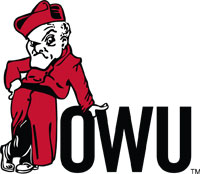
On Jan. 19, President Rock Jones emailed Ohio Wesleyan students asking them to complete a survey on sexual assault, which included questions about how safe students feel on campus and their confidence in school officials.
According to the email, the survey is anonymous and takes about 15 minutes to complete.
The results will be used to inform and improve campus policies, practices and support services.
It also stated the reason for the survey was to gather information about “students’ perceptions of OWU’s climate on unwanted sexual contact and sexual assault, students’ perceptions of how OWU addresses and responds to sexual assault, and whether and how often students have experienced unwanted sexual contact or sexual assault.”
Jones said the administration is “deeply committed” to providing a safe campus for everyone and has a zero-tolerance policy for sexual misconduct.
“We believe this information will help us understand where there may be need for better education and processes and procedures used in response to sexual misconduct,” Jones said.
Dean of Students Kimberlie Goldsberry said a team met over the summer to discuss the many federal guidelines and agencies that share information about sexual assault. A “key initiative” from that team was a campus climate survey, which a subgroup then began to work on.
In the fall, the team discovered that the Higher Education Data Sharing Consortium was working on a similar survey designed for small, residential, liberal arts colleges, so the team shared their information and a final survey was created.
“OWU was a given a window of time to offer the survey,” Goldsberry said. “We chose to do it now hoping that it being earlier in the semester might yield greater responsiveness from the community.”
She said everyone on campus has a role in addressing sexual violence issues. Some of the faculty and staff’s responsibilities include being familiar with OWU’s policies and what it means to report issues of sexual violence.
Goldsberry said students also need to do their part with education, intervention and accountability.
Senior Lauren Rump, an intern in the Women’s Resource Center, said when she received the email about the survey on sexual assault she was “surprised and impressed” that it came from Rock Jones.
When administrators don’t take these issues into their own hands, the responsibility for educational programming “falls on the shoulders of students,” Rump said.
She gave an example from last semester. The Women’s Resource Center was compelled to host a panel discussion about Title IX and its impact on campus because they had so many unanswered questions and thought other students would too.
“I definitely hope more education and stronger campaigns for consent will come out of this,” Rump said.
Rump added that the survey “shows initiative” and she hopes everyone takes it.
“It’s important that they hear from all types of people, but especially those who have had to go through that (sexual assault).”
The email will be sent to students two more times before the March 2 deadline.
I cannot believe I’m old enough to be the editor-in-chief of The Transcript. I know it sounds silly, but I still think I’m 15 years old and in high school, not a 21-year-old junior in college. My high school paper consisted of three of us, which ultimately resulted in its demise upon our graduation.
I’ve wanted to be a journalist since I was in fourth grade when I first really watched the nightly news. I wanted to be the person who gave the news. I also wanted to be a veterinarian, but that is besides the point.
Ever since I found out it was possible to be a journalist, I tried to become one. I’ve written for every publication I could get my hands on. And when looking at colleges, I made sure there was a journalism program available, which is one of the reasons why I ended up at Ohio Wesleyan University.
I cannot believe I’m at the helm of a publication that has shaped my college career for the better. Without The Transcript, I would wander aimlessly through campus without any direction whatsoever.
The Transcript has been a part of my life even before I enrolled at OWU. When I visited potential colleges, I would read each of their newspapers. And through The Transcript, I found out one of my camp friends was the daughter of one of my dad’s work friends.
I realized it was such a small world, all through this publication. All the other schools I looked at had publications, but none were of the quality of the Transcript. Nor did they have that connection like the The Transcript did.
I joined The Transcript when I was a nervous and unsure freshman. The first meeting I went to, I was intimidated by the people who surrounded me in that computer lab.
They all seemed like such journalists and like they knew what they were doing, and they would see right through my charade. I wanted to be as involved as possible, and I wrote any chance I got.
Sure, I wasn’t an amazing writer, but slowly my writing improved and I became more self-confident. With the help of my fellow reporters, I knew what questions to ask when interviewing subjects.
And those people who intimidated me with their reporting skills became such an integral part of my life. I cannot imagine them not being in my life, and I’m grateful I spoke up in those meetings.
My predecessors are among my closest friends and confidants; they are the people who made my passion for journalism grow even stronger. They push me to be a better writer, editor and person. They encourage me to branch out and tackle stories that I would normally not take on. And without them, my love for writing would not be like it is now.
I want to encourage any scared freshman that wants to write to come to our meetings. I want them to have the amazing experience and meet people who will change their lives. Don’t be intimidated like I was; you’ll find your groove and become the writer you aspire to be.
To me, The Transcript is much more than a publication. It’s a way of life; it’s a passion. It’s what you stay up all night working on, what you stress out about, what makes you feel proud of yourself.
As cliché as this sounds, I cannot imagine my college career without The Transcript. I know I would not be the jaded yet optimistic person I am.
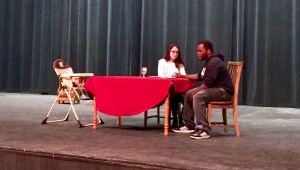
Ohio Wesleyan University’s theatre department gears up for the annual production of One Acts, short plays written, directed and performed by OWU students. The One Acts will occur this semester on the main stage of Chappelear Drama center, Dec. 5 and 6. Auditions for the individual plays were held last week and each of the eight one act plays were cast with two student actors.
Each play is written by a student in the theatre department’s playwriting class and then selected for production by the students in the directing class. Students from any and all departments are encouraged to audition. This aspect of the event was identified by theatre major Emily Poltor, who described the One Acts as “extremely interdisciplinary.”
“It is so great to see new faces in the theatre and One Acts gives everyone an opportunity to get involved. It’s the most inviting event the theatre puts on,” Poltor said. Poltor has been cast in the show for the first time, even though she was the stage manager for last fall’s production of One Acts. She was cast as Ella in the student written play “Once Upon a Couch.”
Dr. Edward Kahn, professor in OWU’s theatre department and supervisor of the production, gave a brief history of the One Acts. In 2005 the department made the decision to move his directing class from the spring semester to the fall, when the playwriting class taught by Dr. Bonnie Gardner was also offered. Previously the students in the directing class had to select their desired one act plays from external sources. This union enabled the two separate classes to join forces in a way that would maximize the student’s practical experience.
“It allows students to put their knowledge together in a way that really matters because they get to share it with a live audience, and they get really excited about doing it,” Dr. Kahn said. As the professor of the directing class, Dr. Kahn sets the schedule for the production of the plays but the students are responsible for everything else. “I do the behind the scenes work of setting up the auditioning schedule and I help keep things organized, but the rest is left up to the students, they have complete control over the process,” said Dr. Kahn.
The One Act plays really seem to have an effect on the students involved in them. “I am actually auditioning for Kindertransport, our next main stage show. One Act auditions were such a great warm up and a real confidence boost for me,” said Polter. She encourages everyone to come and watch the show once it’s ready for performance to see that it is a “great display of student talent.”
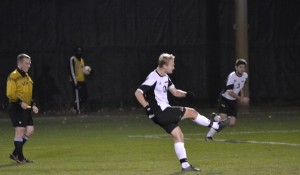
With a 3-2 win over DePauw University on Nov. 6, the men’s soccer team finds themselves in a familiar spot, the North Coast Athletic Conference finals.
There they will meet Kenyon College on Saturday Nov. 8.
During the regular season the two teams played to a tie at Mavec Field in Gambier Ohio. This time the match will take place at the Jay Martin Soccer Complex here on the campus of Ohio Wesleyan.
The Battling Bishops have mustered up an impressive 9-1-1 record at home and look to continue their four game winning streak by claiming the NCAC title. The Lords of Kenyon College also come in to Saturday’s match with a four game winning streak.
“We pretty much know what we’re going to get with Kenyon. They’re big, athletic, physical and intense,” said senior Colton Bloecher.
“I think if we are able to match their intensity and defend well, we will be successful on Saturday.”
Bloecher contributed one goal on two shots and an assist in the win over DePauw.
“I think my goal last night was an important one, but I also think we should have scored a few more, myself included,” he said. “I thought Matt Cohen’s goal a few minutes into the match really set the tone for the night, and Evan Lee’s goal in the second half proved a crucial one.”
In fact, Junior Evan Lee’s second half goal proved to be the difference that would advance OWU to the NCAC finals.
“Last year they (Kenyon) lost to us in the final at our place and it is here (Jay Martin Soccer Complex) again,” Lee said. “They have the motivation to beat us and they are trying to prove that they are the class of the NCAC now. They will come out flying but if we match their intensity then we will be fine.”
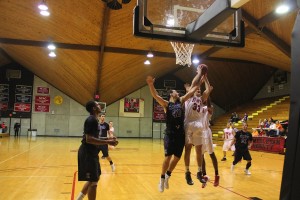
If you asked any player on the Ohio Wesleyan men’s basketball team if there is such a thing as a rebuilding year for the program, the answer would be no.
The team led by Coach Mike DeWitt began practice for the 2014-15 season two weeks ago.
Over the past three years OWU has won at least 20 games during the regular season. Many players who were a part of that success have since graduated. But that doesn’t mean the goals set by this seasons Battling Bishops team is any different than past years.
“We have a young team, and as a senior, and even for the juniors and sophomores, it is important that we play at a championship level every day in order to set the standard for the freshmen,” said senior guard Nick Felhaber, who is the only senior on the team.
A lack of seniority isn’t the only problem OWU faces. Height will be another obstacle to overcome following last year’s graduation of 6 feet 7 inch center Reuel Rogers.
“We are having to make some adjustments to our offensive and defensive strategy this year because we lost a lot of size.” said Felhaber.
Junior Matt Jeske and sophomore Ryan McCron, 6 feet 5 inch post players, could be the solution to this problem. Junior Claude Gray, though undersized, has also found success in the past playing as a forward.
Additionally, junior Joey Kinsley who stands at 6 feet 6 inches will look to fill the role as well. Kinsley is coming off of a shoulder injury that saw him sidelined for most of last season.
“Coming off of a season-long shoulder injury last year, it made me really appreciate and love the game of basketball more than I already did,” said Kinsley. “I would like to help my team out in whatever way possible and necessary in order for us to succeed.”
The motivated Battling Bishops open the season on the road at Kenyon College on Nov. 18. The team will look to continue its past success in one of the toughest division III men’s basketball conferences, the NCAC.
“If we leave it all on the court and do what our coaches ask us, at the end of the day we will once again be successful.” said Kinsley.
(From left to right) Senior Kelsey Gallaher, Myriem Ibourk ’14, senior Katie Butt and Chaplin Jon Powers pose with Eboo Patel, the founder of the Interfaith Leadership Institute (center). Photo: OWU communications.
By Spenser Hickey
Managing Editor
Senior Katie Butt didn’t know her club, Better Together, had won the Interfaith Youth Core’s national “Best Overall Campaign” award until a few hours before the news was officially released.
“When I found out the first thing that I thought of was going back to when I first started this group,” she said.
OWU Better Together was founded two years ago by Butt, who’d been inspired by an interfaith focused spring break mission trip her freshman year.
“I worked with the Interfaith Youth Core doing interfaith relations work and also learning about urban poverty,” Butt said. “And so that following summer I also went to Washington, D.C. for the President’s Interfaith Community Service Campus Challenge and so I got really wrapped up in interfaith work.”
OWU Better Together won for their work on promoting food justice, which according to Butt is “the idea that it’s a basic right of all humans to have access to food.”
“Out of a student body of 1850, (OWU Better Together) engaged 1,300 students in over 40,000 hours of community service,” the judges said.
A key part in their food justice campaign was the Hunger Banquet, held April 17, 2014.
“The hunger banquet is this banquet that’s made for 100 people and it’s meant to show food inequalities globally,” Butt said.
The banquet reproduces global food inequality by offering participants with one of three options at random, ranging from a three course meal with seats for the upper class to rice and water with no seats for the lower income class, according to Butt.
Rachel Vinciguerra ‘14, a member of Better Together and Interfaith House resident, said the banquet also helped combat hunger in Delaware in addition to raising awareness of national and global hunger.
“We raised money and food points,” she said.
Butt said they donated the money to FEED, a local organization, and gave food points to students who didn’t have them; in total they raised more than $1,000 worth.
While Butt liked the work Better Together has done on food justice, she said she hopes the club will continue to promote religious tolerance when she is no longer acting as the president. Butt said that as long as religious tolerance is at the organization’s core, she will be satisfied with whatever other directions the club might take.
“My ultimate goal is just that in a world where religion is such a point of conflict…is to foster a community where that’s not an issue,” she said.
“…We can create an open dialogue about this, so that hatred and bigotry isn’t an issue any more. As long as Better Together is still creating a safe space for people of all religious and non-religious values, that’s all I can hope for.”
By Ellin Youse
Editor-in-Chief
The Delaware Police Department (DPD) arrested Nicholas Corey Lee Eber, 23, of Delaware, OH on charges of attempted murder and felonious assault against senior Anthony Peddle.
Eber is suspected to have stabbed Peddle the morning of Saturday, May 3.Peddle was asleep in his bedroom at the Chi Phi Fraternity house on 216 N. Franklin St. when attacked.
The arrest follows the warrant DPD received Monday for Eber’s electronic devices. Although the Transcript had access to Eber’s identity, his identity was protected as he was not yet identified as a suspect in the case. According to the warrant, Eber received a ride to the fraternity house from an Ohio Wesleyan University student. The student was compliant in working with DPD and has no further affiliation with the case.
In an email to the OWU community, President Rock Jones expressed his appreciation for the Delaware Police Department.
“I am pleased to share with you the announcement from the Delaware Police that they have made an arrest in the case of the stabbing incident last weekend,” he said. “Our records show that the person arrested, Nicholas Eber, has never been associated with Ohio Wesleyan University.”
Director of Public Safety Robert Wood said OWU Public Safety worked closely with DPD on the case as well as to ensure the safety of students on campus. Wood said the details of the added protection cannot be disclosed for security reasons.
“We have protocols and when events of this kind happen, we always look how and if we can add any additional security,” Wood said. “We have been in very close contact with DPD- several times a day, every day. We’ve been so fortunate to work with them, they have been working on this 24 hours a day since the attack.They have been instrumental in this process”
Wood confirmed Eber was consistently suspected to have no affiliation to the university.
“All our indications were that this person was not connected to the university.”
Peddle is the president of the senior class, and Director of Media and Community Relations, Cole Hatcher, confirmed to the Transcript on Tuesday that Peddle will be speaking at Sunday’s commencement ceremony.
Senior class Vice President, Aara Ramesh, said on Monday that she was confident an arrest would be made soon.
“It was really jarring to me to learn that this attack was not randomized, but rather a targeted one,” she said. “I am positive that the perpetrator will be caught and a suitable punishment will be doled out.”
Chi Phi president TJ Clark said Peddle asked the members not to discuss information about the case to the media.